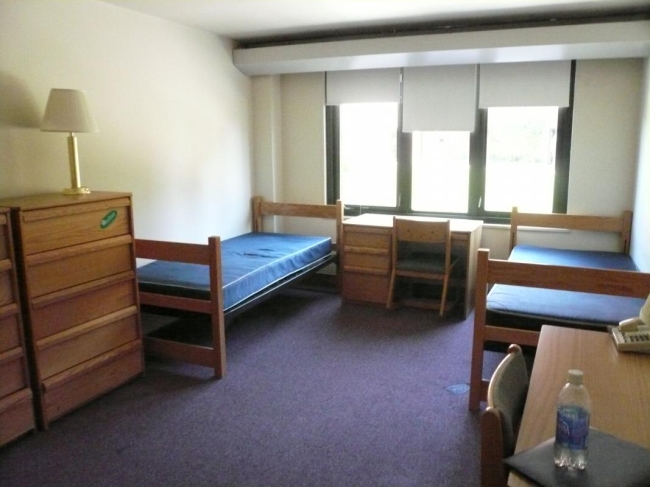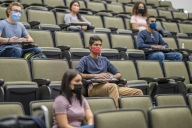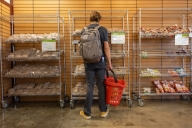You have /5 articles left.
Sign up for a free account or log in.

Wikimedia Commons/Rybread
Most students have left campus now. Aside from a couple of exceptions, such as the University of Washington and Long Island University, colleges have closed residences to stop spread of the new coronavirus. Students now need permission to stay on campus.
But many students who applied were not allowed to stay, said Chris Sinclair, executive director of external affairs at FLIP National, a nonprofit that supports first-generation and low-income students.
"What they won't acknowledge," Sinclair said, making an example of the University of Pennsylvania, "is nearly everyone who applied to stay in campus housing because they couldn't afford to leave was rejected with no appeals process."
Penn, for its part, has emphasized that students who were not permitted to stay were offered generous financial assistance. "Penn has approved and distributed emergency funds to nearly 500 undergraduate students," a spokesperson for the university said via email. "This funding was targeted specifically to students who were not approved to remain on campus but indicated in their application that they had financial concerns that would prevent their immediate departure." The university bought plane tickets, arranged ground transportation and covered baggage costs. Many students who receive aid from the university are now receiving additional financial assistance to ensure food security and internet service for the rest of the semester, the university has said.
Just how many students were permitted to stay obviously varies by institution. Some are hosting many students. At the State University of New York at Buffalo, 1,500 of the usual 8,000 students have been allowed to remain on campus. International students, as well as students who can't make safe living or dining arrangements, who have limited access to technology, or whose primary residence is campus, were all allowed to stay. The criteria were decided with guidance from the governor and system chancellor. In contrast, at Georgetown University, which has nearly 7,000 undergraduates, dining workers have said the campus is only hosting about 200 students, mostly international.
At Chapman University, the campus was set to house 3,450 students this spring. Now there are only about 230 left, said Dave Sundby, director of residence life. There are some students, he said, who might have been able to go home in early March when the pandemic was just beginning but now have family infected or in vulnerable situations.
Sundby said the administration first pared down applications to stay by asking some students for more information.
"We initially had students who thought, 'This will be great! No classes and I just get to party in the neighborhood all the time,'" he said. "We did tell some people, 'What you've provided isn't really enough information,' or 'If this is your only reason for being here, we're going to need to ask you to move out.'"
But the further information some students provided made it obvious that they needed to stay. Some students didn't have beds to sleep in or lived at home with vulnerable family members.
Still, students at other institutions are concerned that their peers have fallen through the cracks.
Anna Macknick, a junior studying linguistics at Princeton University, said that students have been posting on anonymous Facebook pages about the struggles they faced after leaving campus.
"A lot of people have been posting about going home to abusive families, to toxic environments, to not having reliable Wi-Fi," she said. "People were screwed over by the policies that Princeton made, or failed to make."
Princeton was specific in its criteria for which students were allowed to stay. Originally, only those completing thesis research, facing housing or financial insecurity, or residing in university family housing were allowed to stay, along with some international students and those that have been granted status as independent from their parents. Students can apply for independent status, meaning they are not financially dependent on their parents, if they have experienced documented parental abuse or neglect, or meet other criteria such as being married.
Having a generally strained relationship with family or unreliable internet access were not listed as approved reasons for domestic students to stay on campus.
A Princeton spokesperson said that the university reviewed over 1,000 requests to stay on campus and made decisions prioritizing international students and students with the highest financial need. Those who were denied were given an appeals process. Under 500 students remain on campus.
"While we could not approve every student to remain on campus, we remain committed to supporting students, both in their search for off-campus housing and their broader needs," the spokesperson said via email. "If students are having difficulty while away from campus, either with housing or another issue, they continue to have resources and staff available to help address those difficulties -- they are not alone." Counseling and student life resources are still available to students who have left campus.
Macknick, who is from Wisconsin, is one of the few students who have been able to remain on a campus. Princeton previously granted her status as an independent student.
She complained that university guidance was haphazardly rolled out and sometimes reversed. For example, the university flip-flopped its decision to allow thesis research as an approved reason to stay without properly communicating to students, she said. Individual students shared personal emails from staff in group chats to spread the word.
"There's been a lot of issues with inconsistencies," Macknick said.
Princeton has said the reversal was due to fast-changing state restrictions that closed libraries and research labs. Other institutions similarly found it difficult to stick to one message, with travel restrictions and stay-at-home orders changing daily. Some institutions gave students clear timelines to leave campus and then accelerated those timelines.
Life on Campus
The degree to which institutions are enforcing social distancing has been variable. Many institutions have banned students visiting one another in their dorms. At Chapman University, Sundby said that the administration moved each student staying on campus into their own apartment. Some students had to be moved because they were in buildings that were actually too empty -- a building with only a few students becomes a risk for fire, a target for theft, and can mean more work for a hamstrung facilities staff.
But the administration, Sundby said, is not policing social distancing by checking in on students or threatening penalties.
"We're going to provide you with information and set expectations, but we're going to trust that you're doing that without as much active enforcement."
At Princeton, Macknick said she has no access to common rooms or kitchens and is in a dorm room. The university has told students that they stand to lose their housing if they are caught breaking social distancing guidelines.
"Even if I'm walking by a friend in the dining hall and I want to stop and talk with them, I still have this fear in my head of, 'What if we're not completely six feet apart? What if university public safety sees us? What if we get in trouble?'" she said. "Obviously you want to be taking these things seriously, but having the punishment be eviction when the students who are on campus now are in vulnerable situations with housing generally to start, it's just not the right move."
Princeton has said that it is taking social distancing and public health seriously. "In accepting the offer to remain, students agreed to social distancing and were told that their ability to remain was contingent on compliance with this expectation," a university spokesperson said via email. "Living in a dormitory presents particular challenges for keeping people healthy because of the close proximity and shared spaces. We are serious about the consequences of disregard of these conditions."
Alejandra Gonzalez, a freshman at Cornell University, said the administration there has taken a more relaxed approach. While there are rules, they are not being policed in the same way as at Princeton. Gonzalez said she thought Cornell was doing a great job.
"In every single way, I think they were as accommodating as possible, and they really, really worked hard to make sure that students had everything they needed," she said.
Far from what some administrators and faculty feared when letting students stay, Gonzalez says the campus is definitely not a party atmosphere.
"Not having the student body, it feels kind of like a ghost town. Everything is empty, everything's quiet."
Jon Marlon Mirador, a junior at Virginia Commonwealth University, expressed a similar sentiment.
"The city is now dead," he said. Only one of his friends has stayed on campus, and they can see each other occasionally.
Though they've been allowed to stay and say they feel safe, students aren't completely out of the woods yet. Some are grappling with the next uncertainty: summer.
"What happens when the semester ends?" Macknick said. "No one knows if there's going to be summer housing or not."
Her plan if she can't stay is to find a room outside the university, though it will need to be accessible for her disability.
In a response, Princeton said a summer shelter review process will be in place "soon."








